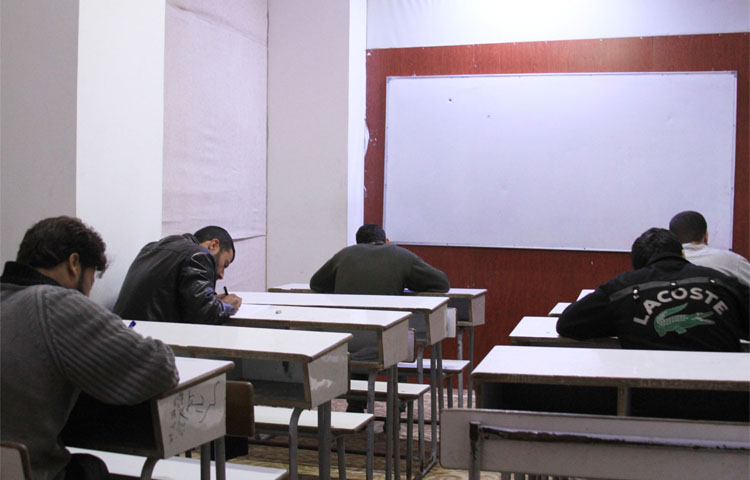Enab Baladi – Daraya
Several attempts have been made to spread reading and writing skills among the illiterate fighters and civilians in the city of Daraya, despite all difficulties imposed by the war, with the objective to eradicate ignorance and to fight the educational decline hastened by over thirteen months of siege.
“Our Aim” is to Educate
Throughout the past months, educational campaigns were launched, such as Fajr Alummah Alislamiyah –which was launched just last month-, Sham for Religious Education, Iqra’ w Irqa, and several other individual initiatives started by the intellectualseducated elite in the city.
These efforts aim at raising the educational status of the people of Daraya, who live under siege; Literacy programs have been welcomed with enthusiasm. Akram, a graduate of Mechanic Engineering and a teacher at Sham Organization, said that about 30 young men, who are not yet 16, enrolled in these programs.
“This eagerness stems from the need and the passion of the besieged people. Some of them want to learn Quran and religious studies; others want to learn how to use the internet to communicate with their families outside the city. Some of them were simply inspired by their friends, and became interested in learning how to read and write”, adds Akram.
Difficulties of Teaching
These programs are faced with several obstacles; delivering information to a generation that passed the learning stage is the main issue. “Teaching this age group requires greater effort to deliver information”, says Akram “I try to create ways to make them more interested and keen on continuing what they’ve started”.
The shelling, which destroyed the city’s warehouses, along with the continuing siege makes it difficult to secure all needed stationery, said Akram who is a volunteer at the literacy program; yet he cannot work full-time there, because he needs to have a paid job.
Learning while Fighting
Abo Qasem, who works at the city’s central pharmacy, said to Enab Baladi that the educated youth in the city have been working diligently to spread literacy; some of them have made individual efforts to educate fighters at front lines. “I tutor a number of fighters who can’t enroll in the courses because of their shift schedule; it’s our responsibility to care for them as well”.
Abo Qasem noted that these fighters –in general- have graduated secondary school; however, educational institutions under Assad regime were corrupt, according to Qasem, and thus most of them find it difficult to read and write.
The 30-year old FSA fighter, Abo Basel, graduated the literacy program, and said that now he can surf the internet and read news and articles, “I no longer suffer from the inferiority complex I had”.
“Read” Reaches All
Literacy courses are not limited to men in the city; an initiative to educate women was implemented as well. The programs targeting women included reading, writing, knitting, and home economics, and are held at Iqra w Irqa School in Daraya.
The school initiative was well-received and welcomed. Om Alkhier, one of the initiative founders, said “despite the adverse circumstances in the city, women are eager to learn and to improve their education”.
“However, some of them withdraw later as the surrounding circumstances worsen as the regime intensifies its pressure on the city… psychological and social pressures, hunger, poverty and deprivation” says Om Alkhier.
Prominent schools in opposition-controlled parts of the city have been either destroyed or damaged by Assad continued shelling; whereas in regime-controlled areas, the schools have been turned into military barracks as a part of Assad policy of suppressing educational and cultural initiatives. A policy Assad started to enforce in the city of Daraya long before the outbreak of the Revolution.
